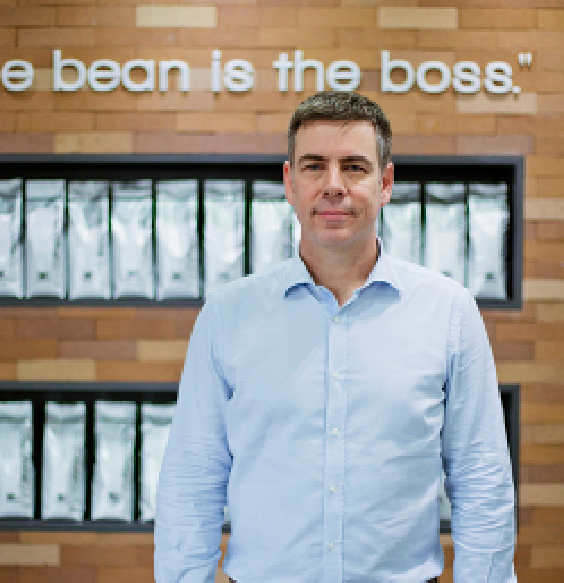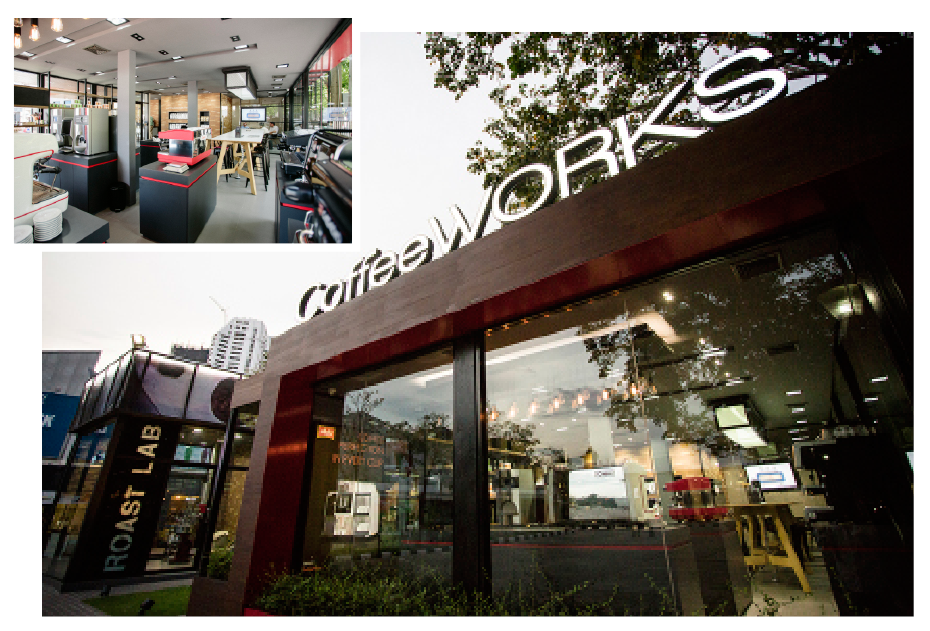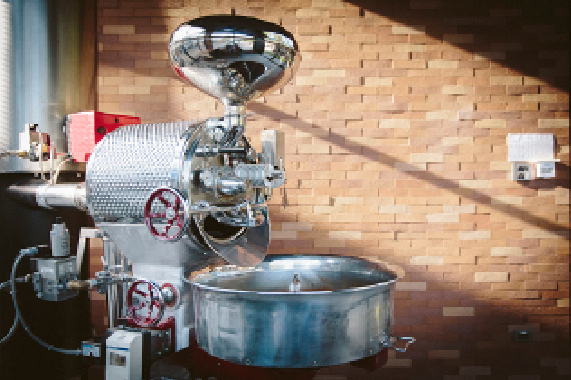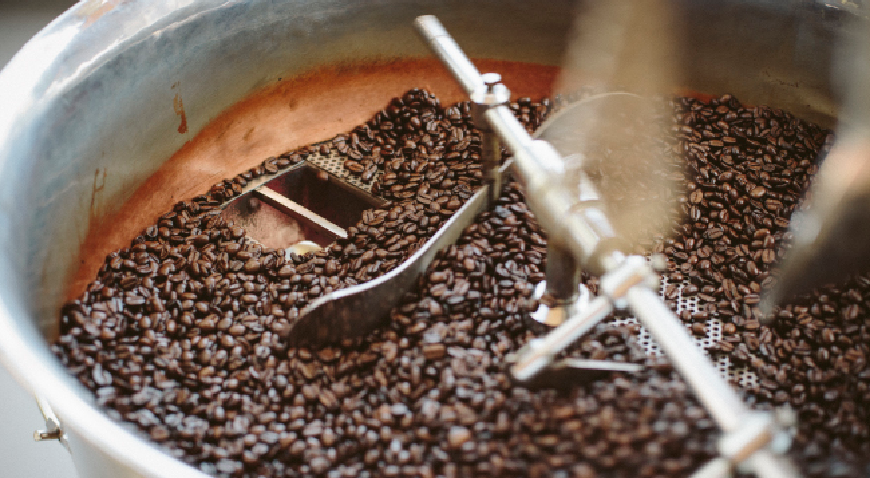| IF you’ve ever enjoyed a cup of coffee in Bangkok, there’s a good chance the beans that make it so delicious come from a company called CoffeeWORKS. In business since 1995, with several blameless setbacks over the years that would have forced other companies to shut up shop, CoffeeWORKS is today one of the top three suppliers of coffee and related equipment in Thailand. Its 800-plus customers include a long list of major corporations with coffee-thirsty staff, many of the country’s best known hotels as well as specialist coffee shops, cafes and chain outlets. Among them are Dean & Deluca, W Hotel, McCafe outlets at McDonald’s Thailand, and Bluecup Coffee by S&P. The man behind CoffeeWORKS is Dale Lee, an American from Michigan who has spent his entire professional life working with coffee. |
| After learning the trade in his home state of Ohio as a “commercial brewer technician” and in sales, Lee moved to Los Angeles which in 1989 was on the cusp of a consumer revolution that saw a boom in specialist coffee shops such as Starbucks. It was a steep but valuable learning curve for the young American. Five years later during a trip to Bangkok to meet up with an old school friend, equities analyst Andrew Stotz, Lee spoke about the West Coast coffee phenomenon. The pair decided that Thailand, then widely touted as an “Asian economic tiger” was ripe for a similar boom and together decided to set up a joint coffee roasting business. “Although coffee shops didn’t exist in Thailand back then, we believed the coffee shop model would quickly spread. However, we did not want to get in the actual operation of coffee shops and decided instead that roasting and distribution of coffee beans was a more sustainable option for us,” explained Lee. With some personal savings, loans from parents and school friends, Lee and Stotz launched CoffeeWORKS. It was, admits Lee, a “garage start-up” with only a handful of customers. To expand, they approached big companies about installing coffee machines to provide “a better coffee experience” for staff and visitors, replacing the tired custom of serving dull instant coffee and tasteless creamers. The tactic worked, but only for a short while. “When the Asian financial crash happened, one of the first victims was the company coffee machine. It was a dark time for us, and we only just survived.” Indeed, it took another five years for the company to become a sustainable business. By this time, CoffeeWORKS had grown into a major supplier of coffee beans to all kinds of coffee-related businesses. |
| These days, it imports coffee beans from 12 different countries, including Tanzania, Brazil and Kenya, all of which attract a punishing 90% import duty. Other suppliers covered by the ASEAN Free Trade Area (AFTA) such as Indonesia and Laos face a much lower (5%) import duty, though the “red tape” imposed even on these nations can prove arduous. CoffeeWORKS is also a strong supporter of coffee growers in northern Thailand. Beginning 10 years ago in partnership with the largest coffee growing NGO in northern Thailand called Integrated Tribal Development Program (ITDP), CoffeeWORKS began funding ethnic minority Lisu hill-tribe coffee farmers in Chiang Mai to produce natural pulped (known as honey processed) coffee in order to improve the quality of their output. Honey processed coffees were long ago perfected in the major coffee growing regions of the world such as Brazil. |
ITDP and Mr Lee speculated that this processing method could help northern Thailand hill tribe coffee farmers improve their coffee crops as well. The results have been spectacular, with Thai coffee beans that are not only on a par with the world’s best, but also fetch higher prices.
“It’s now a long-term sustainable business for hill-tribe farmers as honey processed coffee production knowledge has now spread to other northern Thai farmer groups and is beginning to supply many of the small Bangkok boutique coffee roasters starting here in recent years.
“Moreover, this improved processing method has paid the coffee farmers over 70% higher prices than the world market price for comparatively graded washed coffees,” declares Lee proudly.
The company’s initiative has been recognized by the American Chamber of Commerce with a CSR Excellence Award for the “funding and development of a high quality Thai Arabica coffee.”
Its ultra-modern 150 sq m CoffeeWORKS Experience Center on Sukhumvit Soi 26 incorporates an R&D department, and training centre for baristas and buyers of coffee-making machines. In addition to a roasting plant in Samut Prakan, CoffeeWorks has technical offices in Chiang Mai, Phuket and Koh Samui. Others are planned for Hua Hin and Pattaya. Currently the company employs 75 staff.
The company’s 2015 revenue was 135 million baht. Fresh roasted coffee generates 65% of that income, while the remaining 35% comes from supplying imported commercial coffee machines.
Lee, 51, describes himself as an “unashamed workaholic and devout bachelor” who intends to spend the rest of his life in Thailand.
www.coffeeworks.co.th
“It’s now a long-term sustainable business for hill-tribe farmers as honey processed coffee production knowledge has now spread to other northern Thai farmer groups and is beginning to supply many of the small Bangkok boutique coffee roasters starting here in recent years.
“Moreover, this improved processing method has paid the coffee farmers over 70% higher prices than the world market price for comparatively graded washed coffees,” declares Lee proudly.
The company’s initiative has been recognized by the American Chamber of Commerce with a CSR Excellence Award for the “funding and development of a high quality Thai Arabica coffee.”
Its ultra-modern 150 sq m CoffeeWORKS Experience Center on Sukhumvit Soi 26 incorporates an R&D department, and training centre for baristas and buyers of coffee-making machines. In addition to a roasting plant in Samut Prakan, CoffeeWorks has technical offices in Chiang Mai, Phuket and Koh Samui. Others are planned for Hua Hin and Pattaya. Currently the company employs 75 staff.
The company’s 2015 revenue was 135 million baht. Fresh roasted coffee generates 65% of that income, while the remaining 35% comes from supplying imported commercial coffee machines.
Lee, 51, describes himself as an “unashamed workaholic and devout bachelor” who intends to spend the rest of his life in Thailand.
www.coffeeworks.co.th





 RSS Feed
RSS Feed
















